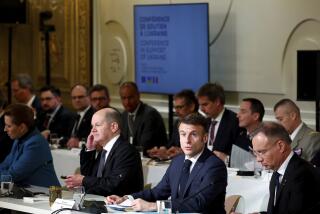CRISIS IN THE PERSIAN GULF : GULF WATCH: Day 102 : A daily briefing paper on developments in the crisis : Military Front:
- Share via
Congressional leaders gave mixed reactions to the buildup of U.S. troops in Saudi Arabia. They agreed on one thing: President Bush needs congressional approval before going to war.
Detroit Auxiliary Bishop Thomas J. Gumbleton said he will ask Roman Catholic bishops to sign a statement asking Catholic soldiers to become “selective conscientious objectors” against war in the gulf. He will press for a discussion of the gulf crisis at an annual meeting of bishops that opens today in Washington.
In Tokyo, Vice President Dan Quayle discussed a military resolution with U.N. Secretary General Javier Perez de Cuellar, but officials did not reveal the U.N. leader’s response. Quayle will discuss the crisis with at least 11 world leaders in Tokyo for the enthronement of Emperor Akihito.
Meanwhile, Czechoslovakia, Poland, Bulgaria and Hungary have offered or are prepared to offer military medical teams trained in treating injuries from chemical warfare.
Diplomatic Front:
Iraq said it would attend a proposed Arab summit if the agenda included the Palestinian question, and if it is consulted on the time and place. The Iraqi offer came in response to an appeal by Morocco’s King Hassan II, who said such a meeting would be a “new and last chance” for a peaceful solution.
Iraqi President Saddam Hussein also said in a British television interview that he is ready for talks on security issues in the Middle East. Asked specifically if he is ready to leave Kuwait, he responded, “We are ready to enter into a deep dialogue. . . . “
Hostage Front:
Iraq tried to swap all its hostages for a nonaggression pledge from France and the Soviet Union but both rebuffed the approach, diplomats said.
They said French President Francois Mitterrand told Jordan’s King Hussein last week that he and Soviet President Mikhail S. Gorbachev rejected the offer at their October summit in Paris.
Soviet and Eastern European Citizens in Iraq and Kuwait:
Soviet Union: 3,000
Yugoslavia: 1,300
Poland: 1,213
Bulgaria: 690
Romania: 640
Czechoslovakia: 66
More to Read
Sign up for Essential California
The most important California stories and recommendations in your inbox every morning.
You may occasionally receive promotional content from the Los Angeles Times.













